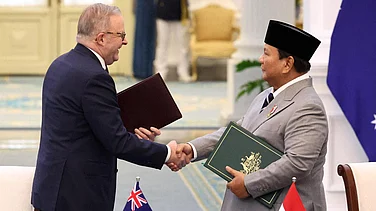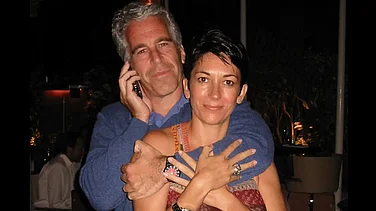Tensions are on the rise once again as South Korea on Friday said that it restarted propaganda broadcasts into North Korea in response to the latter's fresh launch of trash-carrying balloons, which is a resumption of its Cold War era tactics.
In a statement, South Korea's Joint Chiefs of Staff said that it used frontline speakers to resound anti-Pyongyang broadcasts over the border between Thursday evening and Friday morning.
Th broadcasts were first of their kind in about 40 days and though the content of the latest one is yet to be known, the previous broadcast of June 9 reportedly had K-pop songs, weather forecasts and news on Samsung, the biggest South Korean company, along with criticism of North Korea's missile program from a third party.
These propaganda broadcasts from the South could trigger any level of angry response from North Korea which is extremely sensitive to anyone outside, attempting to undermine its political workings.
South Korea, in 2015, had restarted loudspeaker broadcasts for the first time in 11 years, prompting fire from North Korea. As North fired artillery rounds, South Korea also retaliated and returned the fire, officials had said.
Thursday's trash balloons' batch was the seventh of such campaign from North Korea in the recent months, South Korea's military was cited by The Associated Press.
North Korea has floated more than 2,000 balloons filled with wastepaper, scraps of cloth, cigarette butts and even manure, towards South Korea since late May. It said that the balloons were a response to South's activists sending their own balloons to the North, carrying political leaflets.
Notably, no hazardous elements were found in the North Korean balloons. The last fleet of the campaign had flown across South in late June.
South Korea responded to the balloons by suspending a 2018 tension-reduction deal with the North, resuming propaganda broadcasts and front-line live-fire military drills at border areas.
North Korea leader Kim Jong Un's powerful sister, Kim Yo Jong, had hinted at launching the trash-carrying balloons again, saying that South Korean balloons had been found at the border and other North areas again.
Kim Yo Jong warned that South Korean "scum" must be ready to pay a "gruesome and dear price". However, her statement had raised higher concerns for physical escalation rather than balloon launches.
South Korean military on Wednesday had said that it boosted its preparedness to face any provocation by the North, adding that the latter may fire at incoming South Korean balloons across the border or floating mines downriver.
However, it was not immediately known whether South Korea had scattered leaflets in North Korea in recent times. For years, groups led by North Korea defectors have used helium balloons to drop anti-North Korean leaflets, USB sticks with K-pop music and South Korean dramas and US dollar bills in the North.
These activities are termed as serious security threats and challenge to North Korea's ban on foreign news for the majority of its 26 million people.
North Korea had destroyed an unoccupied South Korea-built liaison office on its territory in 2021 as a response to South Korean civilian sending leaflet campaigns.
Tensions have increased between the two sides in the recent years given North Korea's missile tests and the expansion of US-South Korea military drills that are termed as "invasion rehearsals" by the North.
As per The Associated Press, experts have said that North Korea's growing ties with Russia could further empower Kim Jong Un to open bigger provocations, especially ahead of the November general elections in the US.
According to North Korean media, Kim met with a Russian delegation led by Vice Defence Minister Aleksey Krivoruchko. Kim pressed on the need for the two nations' armies to unite on a more firm stance to defend international peace and justice.
Kim had met with Russian President Vladimir Putin in Pyangyong in June, signing a deal requiring each country to provide aid to the other if it is attacked. The two nations also vowed to boost other cooperation. Analysts say the accord represents the strongest relations between North Korea and Russia since the end of Cold War.


























